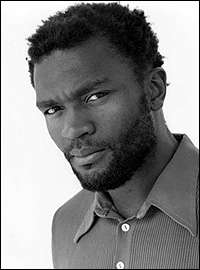Emilio Buale Coka
Ludwig Emilio Buale Coka (born 26 November 1972) is an Equatorial Guinean-Spanish actor of Bubi descent.
Emilio Buale Coka | |
|---|---|
 | |
| Born | Ludwig Emilio Buale Coka 26 November 1972 |
| Occupation | Actor |
Early life and career
Born in Equatorial Guinea, he moved to Spain, with his parents and brothers, when he was six years old. He had no intention of becoming an actor until one day, in 1995, when casting director Paco Pino discovered him as they both waited in a subway station in Madrid. Pino needed a black actor to play Ombasi, one of the main characters of Imanol Uribe's Bwana (1996). Before that, Emilio was studying to become a construction engineer, as well as working as a fireman. He accepted Pino's offer traveling to Almería two weeks later for the filming of the movie. Buale made his debut, along with two well-known Spanish actors Andrés Pajares and María Barranco.
Buale continued getting work in films, TV series and, especially, in theatre. He was a member of the National Classical Theater Company of Spain for a couple of years appearing in many of stage productions such as "La entretenida", "Amar después de la muerte", "Los chicos de la banda" and "Yonquis y Yanquis".
Personal life
Buale is a polyglot, being fluent in Spanish, English, French and Bube. He continues to work as a fireman in Madrid. In fact, he has played a fireman in a few TV series and films:
- "Código fuego" (2003)
- Semen, una historia de amor (2005)
- and an episode of the third season of "La que se avecina" (2007)
Films
- Bwana - 1996
- Adiós con el corazón - 2000
- Mi hijo Arturo - 2000
- Salvajes - 2001
- Ilegal - 2003
- Semen, una historia de amor - 2005
- Hienas - 2009
- The Platform (El Hoyo) - 2019
Short films
- Cien maneras de hacer el pollo al txilindrón (1997) by Kepa Sojo
- Feliz Navidad (1998) by Óscar del Caz
- Impotencia (2002) by Andoni de Carlos
- Así fue mi sueño (2003) by Javier Albalá
- ¿Y tú qué harías (2003) by Emiliano Melgarejo
- El niño que jugaba con los trenes (2004) by Jorge Blas
- Chantal Lis (2004) by Rut Susa and Maria Pavon
- Cara Sucia (2004) by Santiago Zannou
- Salomón (2007) by Ignacio Lasierra
- Cíclope (2009) by Carlos Morett
Television
- Tío Willy (1998) by Eduardo Ladrón de Guevara
- Médico de Familia (1998) by Daniel Écija
- Mediterráneo (1999) by Antonio Hernández
- Pratos combinados (2000) by Chema Fernández
- Arrayán (2001) by Eva Bermúdez de Castro, Jaime D. Triviño y Santiago Pumarola
- Código fuego (2003) by Miguel Ángel Díez y Eva Lesmes
- Hospital Central (2005) by José Mª Caro y Carlos Gil
- Los Serrano (2007) by Daniel Écija
- El comisario (2008) by Ignacio del Moral
- Cazadores de Hombres (2008) by Joan Barbero, Verónica Fernández and Aitor Gabilondo
- La que se avecina (2009) by Alberto Caballero, Laura Caballero, Daniel Deorador
- Amar en tiempos revueltos (2009) by Rodolfo Sirera
- Sin tetas no hay paraíso (2009)
References
| Wikimedia Commons has media related to Emilio Buale. |
- "Emilio Buale". IMDb. Retrieved 22 March 2018.
External links
- National Classical Theater Company of Spain (Compañía Nacional de Teatro Clásico- en Español)
- Emilio Buale on IMDb